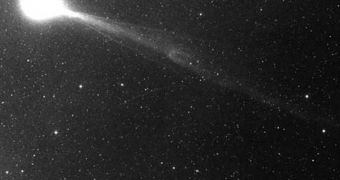According to the newest discoveries in the field, it would now appear that the ancient Greeks may have witnessed the passing of Halley's Comet, which means that the earliest documented sighting of the space rock is about two centuries older than initially calculated.
The new investigation suggests that the Greeks, who were famous for their extensive astronomical knowledge, may have observed the long-tailed comet as it swirled past in 466 BCE.
The research also indicates that the passing of the comet was accompanied by a meteorite impact, an event that most likely changed the way Greeks viewed the Universe.
“It looks like a promising account of the comet. The evidence is all very consistent with Halley's,” explains Daniel Graham, a scientist with the investigation.
He is the leader of the research effort, and also a professor of philosophy at the Brigham Young University, in the United States.
Astronomers are well acquainted with Halley's, which has been passing by Earth for thousands of years. Its head and tail become visible with the naked eye only about 74 to 79 years though.
The space body last passed by Earth in 1986, and is therefore scheduled to make another pass only in 2061.
It was named after English astronomer Edmond Halley, who in 1705 suggested that the comet the world had seen in 1682 was the same as the one recorded in both 1531 and 1607.
He was also the first to predict that the body would again become visible from Earth in 1758, and this of course came to pass. The object was then given his name.
Based on the “strict schedule” the comet keeps, experts can now make “retrodictions” rather than predictions, and determine when the comet passed by our planet in the past.
They can then search for references of such an event in various writings and historical accounts, that have endured from those respective times.
“The predictions for 240 [BCE] are amazing. They really pinned it down to the right part of the sky,” says Eric Hintz, a BYU astronomer and a researcher on the investigation.
Greeks apparently got a chance to observe the comet for 70 to 75 days, given that the space object took a rather peculiar path across the sky, Space reports.

 14 DAY TRIAL //
14 DAY TRIAL //